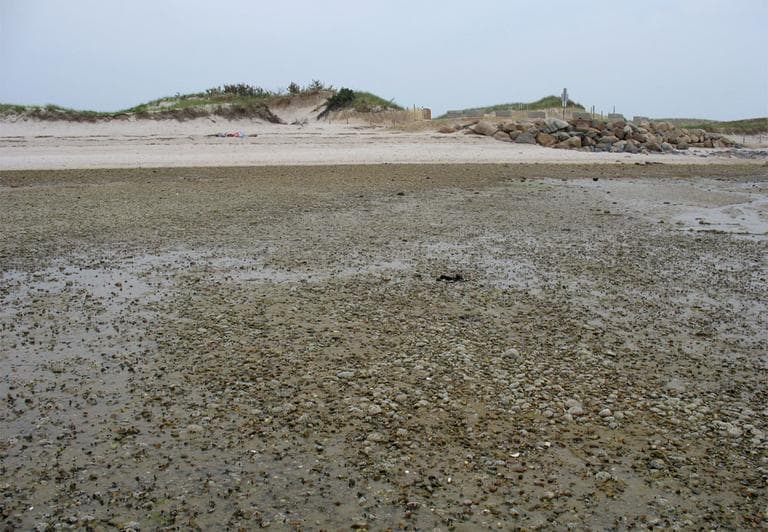Advertisement
Cape Cod Beaches Eroding At Alarming Rate
Resume
During low tide at Dennis' Chapin Beach on Cape Cod Bay, you have to walk about a quarter-mile out before the waves roll in. With the tide out the beach appears endless. But it’s actually getting smaller.
"Most of the Cape is eroding," said Greg Berman a coastal geologist with the Woods Hole SeaGrant program. "I think the number is about 80 percent, or so, of Massachusetts beaches are eroding."
On the Cape beaches are losing about one to two feet each year. At Chapin, it's much more: 10 feet annually.
Berman says you can see it happening before your eyes.
"You can see right in front of us there's a lot of cobble," he said as he walked Chapin. "When you see an eroding beach, you’ll hear people talking about these beaches growing rocks. But really, those rocks are always there. It’s the sand going away."
The erosion is happening because of human and environmental factors. Rock jetties that separate beaches interrupt the natural transfer of sand by the tides and wind. Also, the rock walls that have been built to protect homes are actually stopping dunes from putting sand on the beach. Rising sea levels are also a big factor.
"You’ll hear people talking about these beaches growing rocks. But really, those rocks are always there. It’s the sand going away."
Greg Berman, Woods Hole coastal geologist
What this means to beach-goer Pat Devine is that she may not bother coming back to Chapin this summer.
"I came here today to walk the beach," Devine said. "I didn’t buy my [parking] sticker yet because I don’t know, with the situation, if it’s worth getting a sticker."
Beaches not only attract tourists; they also protect homes and businesses inland. Barrier beaches, such as Chapin, which separate the sea from lagoons, are suffering the most. That's a serious concern to Dennis, says Wayne Bergeron, a town selectman.
"There is simply too much money involved in terms of people’s homes and other issues behind those barrier beaches to ignore them," Bergeron said. "And environmentally, barrier beaches are just too important to not to try to preserve."
What Dennis does will be watched by towns up and down the Cape, according to Bergeron.
"Brewster has lost a lot of area, they are looking at what they want to do," Bergeron said. "Sandwich is doing the same thing right now. This is a coastal problem, not just a town of Dennis problem."
But Dennis' problem is more severe than most.
"We’ve reached a critical stage," said Karen Johnson, head of the town's Department of Natural Resources. She says studies show most of the sand from Chapin has moved to a creek just to the south.
"Unfortunately, we probably should have started to look at this five years ago [and] not waited this long — until it was truly at a critical stage — and we would have had time to experiment," Johnson said.
The long-term fix is beach nourishment, which means dredging the sand in the creek and putting it back on Chapin Beach. That could cost as much as $1 million. But it’s the only long-term plan that works, coastal geologist Berman says.
"Beach nourishment is expensive and it’s something you always have to do," Berman said. "So you have to make kind of a harsh decision economically — if this beach is valuable enough or historically important enough to protect through those methods."
It is worth it, says Bergeron. The money could come from bonds, grants or raising taxes. Bergeron knows raising taxes would be unpopular, but he says it would be a good investment.
"Our beaches are our main part of our economy and because of that we need to do what we can to preserve them," he said.
Because of the approval process, it would be a few years before dredging could start in Dennis. But once they start, it's an unending battle against nature. In the long term — thousands of years — there’s no way to win, Berman says.
"Eventually, unless sea-level rise reverses itself," Berman said. "Unless the glaciers start building instead of losing, Cape Cod will be no more, eventually."
This program aired on August 4, 2011.